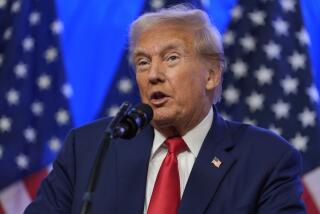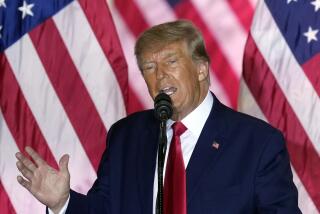Romney says he gained no tax reduction through overseas funds
- Share via
Mitt Romney said Sunday that he gained no tax benefits by investing part of his fortune in funds based in the Cayman Islands and other overseas jurisdictions, or using a Swiss bank account, saying President Obama’s campaign was unfairly accusing him of “some kind of unsavory action.”
“There was no reduction -- not one dollar reduction in taxes -- by virtue of having an account in Switzerland or a Cayman Islands investment,” the Republican presidential candidate told Chris Wallace in a recorded interview broadcast on “Fox News Sunday.” “The dollars of taxes remained exactly the same. There was no tax savings at all.”
It is impossible to tell from documents disclosed to the public how much of Romney’s financial holdings, which his campaign estimates at between $190 million and $250 million and are managed in several blind trusts, are based in offshore funds and investments.
PHOTOS: Preparations for the GOP convention
The 2010 federal tax return filed by Romney and his wife, Ann – the only complete tax return he has released -- includes 32 pages of detail on 17 separate “passive foreign” investments.
The return also reports gross foreign income of $2.7 million from all sources, the most comprehensive measure of how much he and his wife pulled in from international investments that year. His total adjusted gross income for the year was $21.7 million.
Many of Romney’s foreign investments are highly successful hedge funds and other financial instruments that Romney helped set up or invested in while he was at Bain Capital, the Boston-based private equity firm that he founded in 1984 and led until he stepped down in 1999.
Obama’s campaign has pounced on the complex overseas investments, many of which are located in tax havens, and suggested that Romney used them to reduce his tax burden.
In a cache of confidential materials for prospective investors in Bain funds that was leaked last week to the Gawker website, there is evidence that some Bain funds in the Cayman Islands utilized so-called blocker corporations, which allow tax-exempt entities and foreign investors to avoid paying a certain kind of U.S. business tax.
That tactic would not have lowered Romney’s tax bill, but it helped the funds attract more investment dollars from large pension funds and other groups. Some of the offshore Bain investment funds grew to be worth billions of dollars.
Some tax experts have suggested that Romney may have gained a tax benefit by having a retirement account that invests in such offshore funds.
But in the TV interview, Romney shot down the notion that he gained any tax advantage whatsoever.
“The conduct of the trustee in making investments was entirely consistent with U.S. law and all the taxes paid were those legally owed and there was no tax savings by virtue of those entities,” he said.
Wallace pressed Romney on why he didn’t ask the trustee to close his overseas investments before he made his first presidential bid in 2008, just so he could avoid the kinds of questions that have dogged him in this campaign.
“I could have said, ‘Don’t make any investments in any foreign companies, in any foreign bonds, in any foreign currency, only U.S. entities. And by the way, don’t buy any foreign products, don’t have any Japanese TVs, or foreign cars.’ I could have done that,” Romney acknowledged.
PHOTOS: The protests of the GOP convention
“But you know, I did live my life and I expect that by virtue of disclosing all of these things, people can take a look at it and see whether that’s something they’re comfortable with or not. I’m not going to try to hide who I am and try and manipulate my life to try and avoid the truth.”
Obama’s campaign has held up Romney’s now-closed Swiss bank account as a symbol of his vast wealth, featuring it in an ad this spring.
Brad Malt, the trustee who manages Romney’s finances, said in January that he set up the Swiss bank account in 2003 in a trust in Ann Romney’s name “for diversification.” He said the account at UBS, which is headquartered in Zurich and Basel, contained $3 million before he closed it as Romney was launching his presidential campaign in 2010 and that Romney paid U.S. taxes on the $1,700 he received in interest that year.
The GOP candidate failed to include the Swiss bank account on the personal financial disclosure forms that he filed in 2011 with a federal ethics office. Romney’s campaign amended his disclosure forms and added details about the Swiss account after the discrepancy was reported by the Los Angeles Times/Tribune Washington Bureau.
On Sunday, Romney indicated that the Swiss bank account was part of an investment strategy that allowed him to hold foreign currencies. He said the president was attacking his personal finances because he was trying to avoid addressing the economy.
“Their campaign is trying to find something to say, ‘Gee, hey, he had a Swiss bank account,’ which apparently was done by the blind trustee,” Romney said. “I mean, I had no involvement in this, but the blind trust said we’re going to have some currencies, U.S. currency and some in foreign currency, that tends to be something which investors do. But they’re trying to make that seem like it is some kind of unsavory action and frankly all of the taxes are paid exactly as owed and there were no tax savings by virtue of having that vehicle.”
Romney also decried the hundreds of millions of dollars the presidential campaigns are spending this year. He blamed Obama for triggering the arms race by deciding in 2008 to bow out of the public financing system that caps spending by participating candidates.
“To be competitive, obviously, we are following suit,” Romney said. “But I would far rather have a setting where we had both agreed to the federal spending limits. Look, what he’s done has meant that both of us have to spend an inordinate amount of time fundraising. We can’t spent as much time on the campaign trail. And frankly, it increases the potential of money having influence in politics. It’s really, I think, an outrageous decision on his part.”
Even if both Obama and Romney had opted to accept public funding and limit their campaign spending this year, the decision would not have reined in “super PACs” and other outside groups that are expected to spend hundreds of millions of dollars more by Election Day
Follow Politics Now on Twitter and Facebook
More to Read
Inside the business of entertainment
The Wide Shot brings you news, analysis and insights on everything from streaming wars to production — and what it all means for the future.
You may occasionally receive promotional content from the Los Angeles Times.










